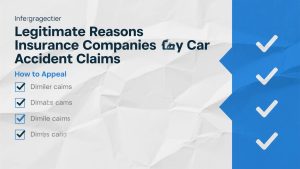When you’re involved in a car accident, the last thing you expect is for your insurance company to deny your claim. Unfortunately, claim denials happen more frequently than most people realize, leaving accident victims struggling to cover medical bills, vehicle repairs, and lost wages. Understanding the legitimate reasons why insurance companies deny claims – and knowing how to effectively appeal these decisions – can mean the difference between financial hardship and fair compensation. The insurance industry operates as a business, and like any business, their primary goal is profitability. This reality creates an inherent conflict of interest when processing claims, as every dollar paid out in settlements directly impacts their bottom line. While insurance companies are legally obligated to act in good faith when handling claims, they also employ teams of adjusters, investigators, and attorneys whose job is to minimize payouts whenever possible. This systematic approach to claim evaluation means that even legitimate claims can face scrutiny and potential denial if they don’t meet specific criteria or if documentation is incomplete. The complexity of modern insurance policies, combined with the emotional and physical trauma following an accident, creates numerous opportunities for mistakes that can lead to claim denials. Many accident victims unknowingly compromise their claims by making statements, accepting quick settlements, or failing to follow proper procedures in the immediate aftermath of their accident. Denied car accident claim lawyer professionals consistently report that the majority of initial claim denials they encounter could have been prevented with proper understanding of insurance company procedures and requirements. The financial impact of a denied claim extends far beyond the immediate costs of medical treatment and vehicle repairs, often creating long-term financial strain that can affect families for years. Understanding both the legitimate and questionable reasons for claim denials empowers accident victims to protect their interests and take appropriate action when faced with an unfair denial. The appeals process, while complex and time-consuming, offers a pathway to overturn wrongful denials and secure the compensation that accident victims deserve under their insurance policies.
Common Legitimate Reasons for Insurance Claim Denials
Insurance companies deny car accident claims for various reasons, some of which are legitimate and based on policy terms, legal requirements, or factual evidence. One of the most common legitimate reasons for denial involves policy coverage limitations or exclusions that clearly state certain types of accidents or circumstances are not covered under the specific insurance policy. For example, if an accident occurs while the insured vehicle is being used for commercial purposes but the policy only covers personal use, the insurance company has legitimate grounds for denial. Similarly, if the policy has lapsed due to non-payment of premiums at the time of the accident, the insurance company is not obligated to provide coverage regardless of fault or circumstances. Another frequent legitimate reason for denial involves accidents that occur outside the policy’s geographical coverage area, such as accidents in foreign countries where the policy specifically excludes international coverage. Insurance claim denial reasons also include situations where the insured driver was operating the vehicle without a valid license, was under the influence of alcohol or drugs, or was engaged in illegal activities at the time of the accident. These exclusions are typically clearly stated in policy documents and represent legitimate grounds for denial based on the contractual agreement between the insured and the insurance company. Fraud represents another category of legitimate denial reasons, occurring when investigation reveals that the accident was staged, damages were exaggerated, or false information was provided during the claims process. Insurance companies invest significant resources in fraud detection and investigation, employing specialized teams and advanced technology to identify suspicious patterns or inconsistencies in claims. When fraud is suspected, insurance companies will conduct thorough investigations that may include surveillance, witness interviews, accident reconstruction, and examination of medical records and repair estimates. If evidence of fraud is discovered, the insurance company not only has the right to deny the claim but may also pursue legal action against the perpetrators. Policy violations also constitute legitimate grounds for denial, such as when the insured fails to report the accident within the required timeframe specified in the policy, typically ranging from 24 hours to several days depending on the insurance company and policy terms. Additionally, if the insured fails to cooperate with the investigation process, refuses to provide requested documentation, or makes material misrepresentations about the accident, the insurance company may legitimately deny the claim based on breach of policy conditions.
Coverage disputes represent another area where insurance companies may legitimately deny claims, particularly when multiple policies are involved or when there’s uncertainty about which policy should provide primary coverage. For instance, in accidents involving rental vehicles, company cars, or borrowed vehicles, determining which insurance policy applies can be complex and may result in legitimate denials if the claim is filed with the wrong insurance company. Statute of limitations issues also provide legitimate grounds for denial when claims are filed after the legal deadline for pursuing compensation has expired, which varies by state and type of claim. Pre-existing damage to vehicles can also lead to legitimate denials when insurance companies can demonstrate that claimed damages existed before the accident in question, often through pre-accident photographs, previous repair records, or expert examination of the damage patterns. Mechanical failures that cause accidents may also be legitimately denied if the insurance company can prove that the accident resulted from vehicle defects or maintenance issues rather than a covered peril under the policy. In cases involving uninsured or underinsured motorist coverage, insurance companies may legitimately deny claims if the claimant cannot prove that the at-fault driver was actually uninsured or underinsured at the time of the accident. This often requires obtaining official documentation from the at-fault driver’s insurance company or state motor vehicle departments. Weather-related accidents may face legitimate denials if the insurance company can demonstrate that the accident was caused by the driver’s failure to adjust driving behavior to dangerous conditions rather than the weather itself being the proximate cause. Additionally, accidents involving vehicles that have been modified in ways that affect safety or performance may be legitimately denied if these modifications contributed to the accident or if they violate policy terms regarding vehicle alterations. Understanding these legitimate reasons for denial helps accident victims evaluate whether their claim denial is justified and whether pursuing an appeal is likely to be successful. However, it’s important to note that insurance companies sometimes cite these legitimate reasons inappropriately or apply them too broadly in an attempt to avoid paying valid claims, making professional legal evaluation crucial when facing any claim denial.

Questionable and Improper Denial Tactics
While insurance companies do have legitimate reasons for denying claims, they also employ questionable tactics that may constitute bad faith practices designed to minimize payouts on valid claims. One of the most common improper denial tactics involves the deliberate misinterpretation of policy language, where insurance companies apply overly narrow interpretations of coverage terms that favor their interests rather than providing the broad protection that policyholders reasonably expect when purchasing insurance. This practice often involves citing obscure policy exclusions or conditions that don’t actually apply to the specific circumstances of the accident, hoping that claimants will accept the denial without challenging the interpretation. Another problematic tactic involves the use of biased or inadequate investigations, where insurance companies either rush through the investigation process without gathering sufficient evidence or conduct investigations with a predetermined outcome in mind. This may include failing to interview key witnesses, not visiting the accident scene, or relying solely on their insured’s version of events without properly investigating the claimant’s account. Insurance companies may also improperly deny claims by demanding excessive or irrelevant documentation that goes beyond what’s reasonably necessary to evaluate the claim, creating bureaucratic obstacles designed to frustrate claimants into abandoning their claims. The practice of “lowballing” initial settlement offers and then denying claims when claimants reject inadequate offers represents another questionable tactic, as insurance companies may claim that the rejection of their offer constitutes an unreasonable demand that justifies denial. Appeal denied insurance claim processes often reveal that insurance companies have improperly applied policy terms or failed to conduct thorough investigations before issuing denials. Delay tactics represent another area of concern, where insurance companies unnecessarily prolong the investigation process in hopes that claimants will become desperate for compensation and accept inadequate settlements, or that they’ll miss important deadlines for filing appeals or lawsuits. These delays may involve repeatedly requesting the same documentation, scheduling and rescheduling examinations or inspections, or claiming that additional investigation is needed without providing specific justification for the delays.
Medical claim denials often involve improper tactics such as having insurance company doctors review medical records without examining the claimant, then using these “paper reviews” to dispute the necessity or extent of medical treatment. Insurance companies may also improperly deny claims by arguing that injuries are pre-existing without conducting proper medical examinations or obtaining complete medical histories that would support such conclusions. The practice of “reservation of rights” letters can also be misused, where insurance companies send these letters claiming they’re investigating potential policy violations or exclusions without having legitimate grounds for such investigations, creating uncertainty and pressure on claimants to accept quick settlements. Another questionable practice involves the selective use of surveillance, where insurance companies conduct surveillance on claimants but only present footage that appears to contradict injury claims while withholding evidence that supports the claimant’s case. Insurance companies may also improperly deny claims by misrepresenting the legal standards that apply to the claim, such as incorrectly stating the burden of proof required or misapplying state laws regarding fault determination or damage calculations. The use of computer programs and algorithms to automatically flag claims for denial based on predetermined criteria can also lead to improper denials, particularly when these systems don’t account for the unique circumstances of individual cases or when they’re programmed with overly restrictive parameters. Social media monitoring represents another area where insurance companies may cross ethical lines, using information taken out of context from claimants’ social media accounts to justify denials without considering the full picture or the privacy implications of such surveillance. Some insurance companies also engage in the improper practice of “claims churning,” where they repeatedly request additional information or documentation not because it’s necessary for claim evaluation, but to create the appearance of ongoing investigation while actually stalling the process. The misuse of independent medical examinations (IMEs) is another concerning practice, where insurance companies select doctors known for providing opinions favorable to insurance companies rather than truly independent medical professionals, or where they schedule multiple IMEs without legitimate medical justification.
Effective Strategies for Appealing Denied Claims
Successfully appealing a denied insurance claim requires a systematic approach that combines thorough documentation, legal knowledge, and strategic communication with insurance company representatives. The first step in any effective appeal involves carefully reviewing the denial letter to understand the specific reasons cited for the denial and identifying any factual errors, misinterpretations of policy language, or procedural violations that may have occurred during the claims process. This review should include comparing the denial reasons against the actual policy language to determine whether the insurance company has correctly applied the terms and conditions of the coverage. Gathering additional evidence represents a crucial component of the appeal process, particularly when the original denial was based on insufficient documentation or incomplete investigation. This may involve obtaining additional medical records, securing witness statements that weren’t previously collected, commissioning independent expert evaluations of vehicle damage or accident reconstruction, or gathering photographic evidence that supports your version of events. The timing of the appeal is critical, as most insurance policies and state regulations specify strict deadlines for filing appeals, typically ranging from 30 to 180 days from the date of the denial letter. Missing these deadlines can permanently bar your right to challenge the denial, making prompt action essential even if you need time to gather additional evidence or consult with legal counsel. When preparing the appeal documentation, it’s important to address each specific reason for denial with concrete evidence and clear explanations that demonstrate why the denial was incorrect or inappropriate. This documentation should be organized professionally and include a detailed timeline of events, copies of all relevant documents, and a clear statement of what resolution you’re seeking from the insurance company. The appeal letter itself should be written in a professional tone that avoids emotional language while clearly stating the facts and legal arguments that support your position.
Working with experienced legal counsel can significantly improve the chances of a successful appeal, particularly in complex cases involving serious injuries, significant property damage, or questionable denial tactics by the insurance company. Denied car accident claim lawyer professionals bring specialized knowledge of insurance law, claims handling procedures, and negotiation tactics that can be invaluable in challenging improper denials. Attorneys can also help identify potential bad faith practices by the insurance company and pursue additional remedies beyond simply overturning the denial, including claims for consequential damages caused by the improper denial. The appeal process often involves multiple levels of review within the insurance company, starting with the claims adjuster’s supervisor and potentially escalating to regional managers or corporate review boards. Understanding this hierarchy and knowing how to effectively communicate with each level of decision-maker can improve the chances of success. In some cases, it may be beneficial to request a face-to-face meeting with insurance company representatives to present your case in person, particularly when the denial involves complex factual issues or when personal testimony can help clarify misunderstandings about the accident or injuries. State insurance departments also provide valuable resources for appealing denied claims, offering complaint processes that can pressure insurance companies to reconsider improper denials and providing regulatory oversight that helps ensure fair claims handling practices. Filing a complaint with the state insurance department creates an official record of the dispute and may trigger regulatory review of the insurance company’s claims handling practices. Alternative dispute resolution methods, such as mediation or arbitration, may also be available depending on the policy terms and state regulations, providing a less expensive and time-consuming alternative to litigation while still offering the opportunity to present your case to an impartial decision-maker.
Documentation strategies for appeals should include maintaining detailed records of all communications with the insurance company, including dates, times, names of representatives spoken with, and summaries of conversations. This documentation can be crucial in demonstrating patterns of bad faith behavior or procedural violations by the insurance company. When dealing with medical claim denials, obtaining independent medical evaluations from qualified physicians who can provide objective assessments of injuries and treatment necessity can be particularly effective in challenging insurance company medical opinions. These independent evaluations should specifically address the reasons cited for denial and provide detailed explanations of why the insurance company’s medical conclusions are incorrect. In cases involving vehicle damage disputes, obtaining independent appraisals from certified automotive experts can help challenge insurance company damage assessments that may be artificially low or that fail to account for all necessary repairs. The use of expert witnesses, such as accident reconstruction specialists, medical professionals, or automotive engineers, can provide credible testimony that supports your appeal and contradicts the insurance company’s denial reasons. When preparing for the appeal process, it’s also important to research the insurance company’s claims handling history and any regulatory actions or consumer complaints that may indicate patterns of improper claim denials. This information can be valuable in demonstrating that your denial is part of a broader pattern of bad faith practices rather than an isolated incident. Appeal denied insurance claim success often depends on persistence and the willingness to escalate the matter through multiple levels of review, as initial appeals are sometimes denied automatically without proper consideration of the evidence presented. The threat of litigation can also be an effective tool in the appeal process, particularly when the insurance company’s denial appears to be in bad faith or when the potential damages significantly exceed the disputed claim amount. However, litigation threats should be used judiciously and only when there’s a genuine intention to follow through, as empty threats can damage credibility and reduce the effectiveness of future negotiations.



